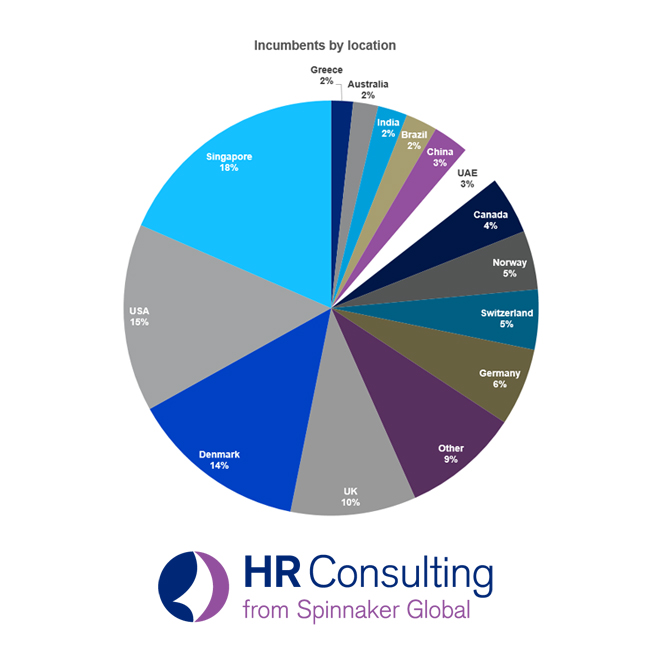Changing Course
Share this blog
Latest Maritime Vacancies
Client Executive
Technical Superintendent (Dry) – Europe
Tanker Technical Superintendent – Europe
HSSEQ Superintendent – Europe
Fleet Manager (Dry) – Europe
Freight trader and charterer bonuses

The most senior freight traders earned bonuses 18 times those of traditional chartering staff in 2018 according to the latest annual report issued by the Maritime HR Association, managed by Spinnaker Global Ltd.
The 12th annual salary survey conducted by the HR Consulting division of Spinnaker Global on behalf of the nearly 100 members of the Maritime HR Association gathered data for over 25,000 shipping professionals around the world, including more than 1,000 chartering and freight trading professionals in 31 countries.
More than half (57%) of those are based in Singapore, the USA, Denmark or the UK – see pie chart. “This may reflect the membership of the Association to some extent,” says Spinnaker Global’s Amanda James, Compensation & Benefits Consultant at HR Consulting, “but a great many of the major players are represented so we do feel that the demographics are there or thereabouts.”
Four-fifths of these commercial staff are labelled by their employers as traditional chartering staff, chartering out owned tonnage or chartering in vessels to carry in-house cargoes. The other 20% are freight traders, operating third party tonnage (and possibly owned tonnage too), taking on cargo exposure as well as hedging exposure to freight market risks.
At junior levels (typically those with less than five years’ experience) there is very little difference between chartering and freight trading base salaries. A modest premium of around 15% is paid to more experienced and management-level freight traders.
However, it’s the bonuses that really set freight traders apart. In the 2018 survey, median bonuses for freight traders were higher than for charterers across all levels of seniority except at the most junior level but, as the bar chart shows, the gap widens dramatically as seniority increases.
At the most senior level within the function – “Director / Head of Department” – median bonuses were more than 1800% higher for those involved in freight trading compared with those in traditional chartering roles. “That’s £19 compared to £1,” explains James. Senior freight trading managers also earned bonuses that were a multiple of those of their chartering peers last year, the median freight trading bonus figure being almost four times the chartering number.
“The big question we’re always asked is whether the difference is justified,” says James, “and the answer is that it probably is. You have to bear in mind that the skillset required to juggle – successfully – the competing risks of owning ships, going long on cargo commitments and chartering in tonnage whilst at the same time marking to market and properly managing risk, whether with paper or physically …well, it’s in short supply.”
Matthew Cornelius who heads up the commercial team within the recruitment division of Spinnaker Global concurs. “Only a small number of organisations truly know how to trade freight and their best people are rewarded well for their performance. There aren’t many of them and most of them hone their skills long-term with one organisation and so the laws of supply and demand apply. The good ones earn their bonuses and certainly can’t be accused of riding a freight-rate gravy train – they’re as likely to make money when rates are down as when they are up. Bonuses will be zero when they get it wrong.”
The Maritime HR Association data reveals that CEOs and HR teams differ in their approach to freight trading bonuses, some organisations taking a team-based approach and others an approach based upon the individual. Opinions are split – and firmly held – as to which is the best and least divisive method to keep colleagues all pulling in the same direction and to minimise office politics. “Clearly there is no one right answer,” says Spinnaker Global’s Chairman Phil Parry. “I’ve had the conversation hundreds of times over the last 20 years with countless CEOs and Commercial Directors. It’s as much about the overall business culture, long-term consistency and the style of the CEO as it is about the actual method adopted.”
To find out more about shore-based salary benchmarking and membership of the Maritime HR Association visit hrc.spinnaker-global.com/